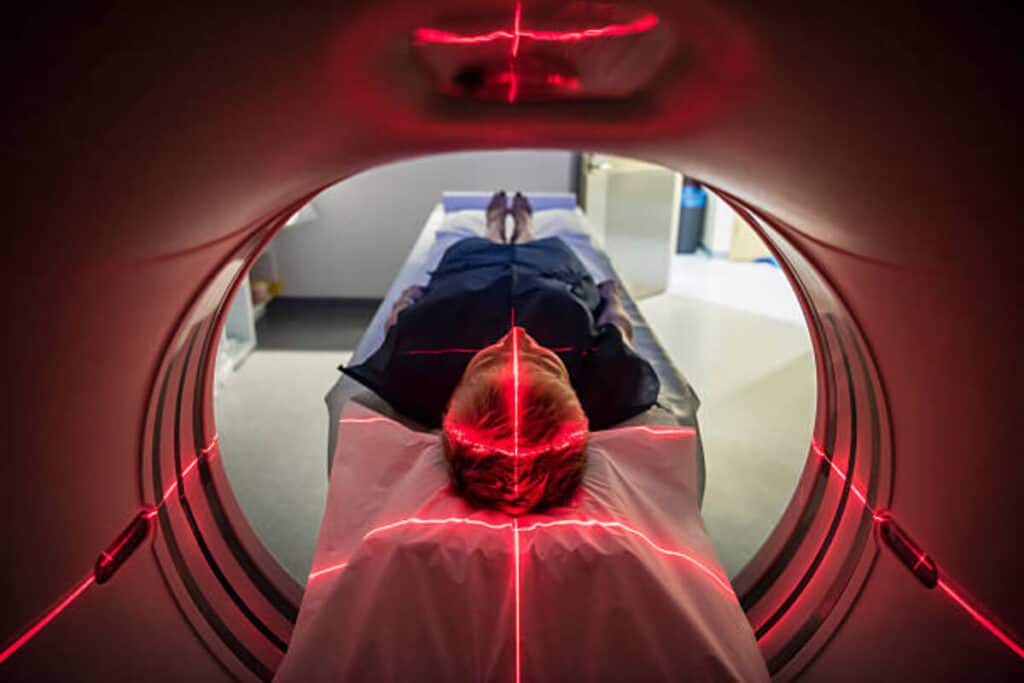In some instances, a medical professional will need to see within a patient’s body. In situations like this, an X-ray is frequently used. Over time, X-rays have improved and become more sophisticated. The CT scan is one such variation. Find out the cost of a CT Scan in Nigeria in this article.
What is a CT scan?
Computers and rotating X-ray devices are used in Computerized Tomography (CT) scans to provide a cross-sectional image of the body. It combines a number of body photos taken from various perspectives to provide a clearer, more in-depth view of the soft tissues, blood arteries, and bones inside the body.
Compared to images obtained from standard X-ray equipment, those from a CT scan are sharper and provide more detailed information. A Ct scan can be used to see different bodily components.
Common locations for applications are:
- head
- chest
- spine
- heart
- knee
- shoulders
- abdomen
Also, check out Where a Microbiologist can work in Nigeria.
How is a CT scan done?
In less than 30 minutes, a CT scan can be completed. In most cases, the procedure is painless. Depending on the area of your body that will be scanned during the CT scan, you might need to take some or all of your clothes off before changing into a hospital gown.
All metallic items, including jewelry, a belt, dentures, and eyeglasses, must be taken off as a precaution. This is because metallic items obstruct the interpretation of the X-ray images. The doctor could also tell you to wait a couple of hours before the scan before consuming any food or liquids.
When doing a scan on a baby or toddler, the doctor may sedate the patient to quiet the youngster and limit movement. This is so that movement during the scan doesn’t provide a hazy image that eventually produces an erroneous result.
The use of a specific dye known as contrast material is necessary for some CT scans. By blocking X-rays and showing up as white on the images produced, this contrast dye helps to highlight the body parts being investigated. The highlighting process makes it easier to see the intestines, blood arteries, and other bodily structures.
There are three main techniques to provide contrast materials. Which are:
- Orally: If your stomach or esophagus is to be scanned, you might be needed to ingest a drink that contains the contrast material. The liquid that is consumed could taste bad.
- Intravenously: The contrast material may be injected into your arm if the liver, gallbladder, urinary tract, or blood arteries need to be scanned. During the injection, you can notice a strange metallic taste on your tongue or a heated sensation.
- Rectally: Contrast material can be inserted into the rectum and administered that way. This makes it easier to see the intestines clearly. Similar to other administration methods, rectal administration will leave you feeling bloated and uneasy.
A CT scanner resembles a large doughnut with a hole in the middle. It has a small motorized table that can glide through the gap and into the tunnel.
On this table, the patient lies down, with the possibility of using straps and pillows to support the body. A customized cradle is installed on the table to hold the head steady in order to do a head scan.
Detectors and X-ray tubes will rotate around the patient once the motorized table has been slid into the scanner. With each rotation, several images of thin slices of the body will be produced. It may be uncomfortable to hear buzzing and whirring noises coming from the machine as it works.
A technologist who can see and hear you will be in another room. The intercom is used at that point for communication. The technologist or doctor may ask you to hold your breath at specific times during the scan in order to prevent hazy images.
If contrast was administered, you might receive additional instructions after the scan. You might be instructed to stay home for a short while after the scan or to drink a lot of water to help the kidneys excrete the contrast material.
Also, check out How to Check Your BVN in Nigeria.
Why is a CT scan done?
CT scans are advised for a number of reasons. Typically, it is useful in cases of slips, falls, injuries, etc.
Your doctor may order a CT scan to help:
- Identify infections, bone fractures, and muscular diseases.
- Locate any internal injuries, internal bleeding, or perforations and determine their presence and extent.
- Identify the location of masses, tumors, blood clots, foreign objects, and masses.
- Radiation therapy, surgery, and biopsy are guided operations.
- Examine the blood arteries and keep track of specific illness problems. Keep an eye on the success of cancer and heart disease treatments.
What is the cost of a CT scan in Nigeria?
Depending on the body portion being scanned, a CT scan might cost between N30,000 and N90,000. In comparison to private hospitals or diagnostic facilities, it is less expensive in government-run institutions.
What is the risk Involved?
Radiological exposure
During a CT scan, the patient is briefly exposed to ionizing radiation. A patient is exposed to more radiation during a CT scan than during a standard X-ray. This is significant since CT scan images provide more detailed information.
Low radiation doses experienced during a CT scan have not been shown to be harmful over the long term, but exposure to much higher radiation doses has been linked to an increased risk of cancer.
Despite this issue, CT scans continue to be widely used. This is so because the procedure’s benefits greatly outweigh any potential risks. Additionally, medical professionals are cautious enough to perform the required scan with the least amount of radiation.
In addition, faster, newer CT scanners that use less radiation have been created.
A concern for expecting mothers
Even though there is a low chance that the machine’s radiation will harm the unborn child, it is wise and strongly advised that you let the doctor know you are expecting.
In order to protect the unborn child from ionizing radiation, your doctor may decide to suggest a less dangerous scan or examination, such as an MRI or ultrasonography.
In general, the modest radiation dose used in CT scanning has not been associated with any negative effects on people.
Sensitivity to contrast materials
Contrast material, a unique dye, is needed for some CT scans. This contrast dye serves to highlight the regions of the body being inspected by blocking the X-rays, thereby showing as white on the acquired images.
You may be needed to consume the dye or have it supplied to you intravenously or through an enema. Patients who are allergic to the dye may experience an allergic reaction as a result.
Final Notes on The Cost of a CT Scan in Nigeria
A Ct scan can be used to visualize several parts of the body such as the head, spine, knee, abdomen, heart, etc, and the price range from N30,000 to N90,000 depending on the body part involved.
Before you go, check out the Best Blood Tonic Brands in Nigeria.








Pingback: Reliable DNA Testing Facilities in Lagos | EntsToday